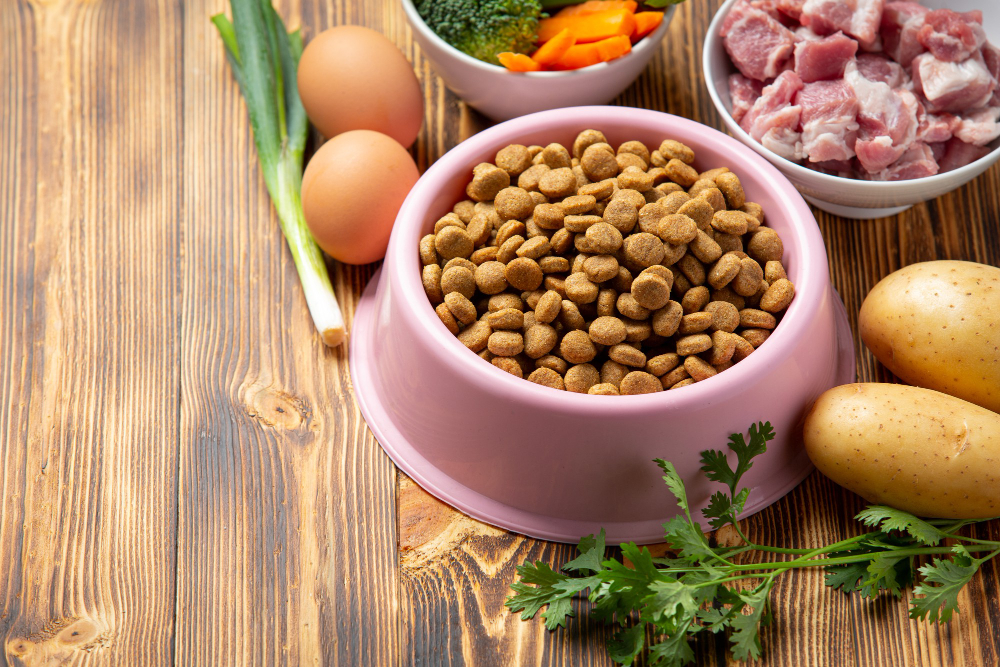We diligently watch our diets and supplement them to ensure we get all the necessary nutrients. But have you considered that the same principles apply to your dog’s Diet, perhaps even more so?
If not, read this entire article; you will get eye-opening facts about the importance of a balanced Diet for dogs.
But first, let’s see what common mistake pet parents are making unintentionally while feeding their pets:
In India, it’s common to find pets in every third or fourth household, which shows pure love for pets. Every pet parent does their best to make their furry’s life the best.
However, they unintentionally make a few mistakes that can affect their pet’s health.
What are these mistakes?
- Feeding Human Food
- Not adding required protein in food
- Not adding Supplements to the Diet
- Not giving much attention to grooming
- Using chemical products like shampoo
We have listed a few common mistakes, but one mistake that can lead to many other problems is not adding proper nutrients to your pet’s Diet. If you are not feeding your dog the appropriate food, it is slowly making your pet weak.
Again, we want to mention that pet parents are doing all this unintentionally or if they are not aware of the essential requirements of their pet.
If you were also doing the same, there is no need to regret it; it’s time to take action because we are here to help you make your dog’s Diet full of nutrition.
Essential Nutrient For Dogs
Proteins: Dogs need protein because it helps their bodies grow and stay healthy. Protein is like a building block for the body, and it helps the muscles and other essential parts work properly. Dogs can make 13 of the 23 amino acids themselves, but they need to get the rest from their food.
Fats: Your dog’s body can’t make enough essential fatty acids on its own, so they need to eat food that has them. A few examples include:
- Linoleic acid
- Omega-6
- Omega-3
Carbohydrates: Carbohydrates are crucial in providing energy to fuel the various tissues in your beloved canine’s body, ensuring optimal functioning. Additionally, these essential nutrients contribute to maintaining the overall health and well-being of your furry companion’s intestines. A few examples include:
- Sugars
- Starches
- Fibre
Vitamins and minerals: Your dog can get all the vitamins and minerals they need in “balanced” dog food. A few examples include:
- Vitamin A
- Vitamin D
- Vitamin E
- Vitamin K
- B-complex vitamins
- Calcium
- Phosphorus
Nutrients That Might Miss in Home-Cooked Food
The interesting part that most pet owners might not know is that your dog’s body can not produce the essential fatty acids, but it is crucial for their proper well-being.
Now the question arises: how can you easily incorporate these essential nutrients into your dog’s good? Well, continue reading to know the answer!
Omega Fatty Acid: Omega-3s, particularly EPA and DHA, are vital for keeping your dog’s skin healthy, coat shiny, and overall inflammation regulation. While your dog’s body cannot make itself, you should consider switching to some dog food that includes these; the levels might not be sufficient, especially for dogs with specific health conditions.
Apart from dog food, the best way to fulfil the value of omega is to add supplements rich in omega to your dog’s Diet. Omega 369 for Dogs can do wonders. If you are uncomfortable giving supplements, you can also consider supplementing with fish or flaxseed oil after consulting with your vet.
Vitamins: Vitamins A, E, and B-complex are essential for your dog’s body to work correctly. They help them maintain healthy skin and eyes and help them do other activities. Usually, eating lots of different foods gives dogs enough vitamins, but sometimes, they might need extra help if they have specific health problems. That’s when it’s a good idea to buy a special Dog Multivitamin Syrup with all the vitamins we need for dogs.
Fibre: Fibre is essential for digestive health but is often overlooked in dog diets. It aids in digestion and helps keep the gastrointestinal system running smoothly. Carrots, pumpkins, and certain grains can be good sources of fibre. However, balancing fibre intake is essential, as too much can lead to digestive issues.
Trace Minerals: Elements like zinc, iron, copper, and selenium are crucial in small quantities for various bodily functions. While commercial dog foods are formulated to include these, home-cooked diets may require a veterinary-formulated supplement to meet these needs.
Summary: A healthy and nutritious Diet is not what the human body needs, but your pet also needs the same attention when it comes to Diet. So, never skip the chance to grab the information regarding your pup’s nutrition requirements. The more you educate yourself about this, the less your furry will get ill and enjoy life to the fullest.

